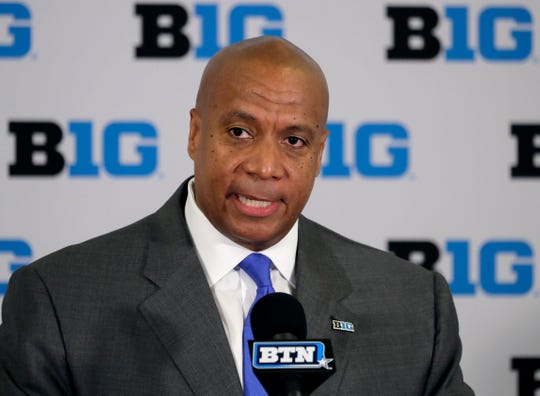Why the Big Ten continues to be a game-changing conference

Minnesota Vikings chief operating officer Kevin Warren talks to reporters after being named Big Ten Conference Commissioner during a news conference Tuesday, June 4, 2019, in Rosemont, Ill. (Photo: Charles Rex Arbogast, AP)
The Big Ten has a history of making unprecedented moves in today’s game of Intercollegiate sports.
The conference was the first to implement the Instant Replay Review in 2004. Not to mention the Big Ten was the first conference to launch its’ own television network 12 years ago. Most notably, the Big Ten made a ground-breaking move Tuesday when it hired the first African-American Commissioner in Kevin Warren to succeed the legendary Jim Delany.
There are thousands of fans across the country that feels minorities are still lacking in Power Five football with head coaches and in the upper office. This has caught the attention of the Board of Governors who regulates the NCAA and certain steps have been taken.
Last year Washington State hired the first Asian-American in Patrick Chun to become its’ Athletic Director. Pro Football Hall of Fame defensive back and former USC Trojan Ronnie Lott was added to the Playoff Committee. Along with Arizona State professor Paola Boivin, who became the second female to be added to the elite panel.
However, the hiring of Warren to run the Big Ten was a complete shocker to the College Football world. Not because of his race, or his lack of background in the NCAA. It was how his name surfaced Monday out of nowhere and how swiftly Warren emerged as a favorite for the job.
The 55-year old had the qualifications to lead one of the most prestigious conferences in all of College sports. Warren was the Chief Operating Officer of the Minnesota Vikings and was also the highest ranking African-American executive working on the business side for an NFL team.
Now Warren will be replacing Delany, who has held his position for 30 years and was regarded as one of the most powerful individuals in Intercollegiate athletics. One of the important tasks Warren will be asked to do is repair the Big Ten’s image and how the conference is perceived on a national landscape.
It seems as if Delany lost his touch towards the finish line with the Big Ten being left out of the College Football Playoff for the past two years. The Big Ten also needs to improve on its’ number of basketball teams getting into the NCAA Tournament on an annual basis. The conference also has a drought in baseball. No Big Ten team has reached the College World Series since Indiana did in 2013.
Still, Warren was brought to the Big Ten to make changes and create a better legacy for the conference in the near future. Big Ten student athletes continue to excel in the classroom in academics and their graduation rate still sits at a high percentage.
Most importantly, the conference recorded nearly $759 million in revenue during its’ 2018 fiscal year, which ranked first among Power Five Conferences. The Southeastern Conference came in second, recording just under $660 million from the same period.
Warren will officially be in office early 2020. In the meantime the Big Ten will continue to be a major player in the NCAA and we should expect more surprises from the historical conference in the near future.






